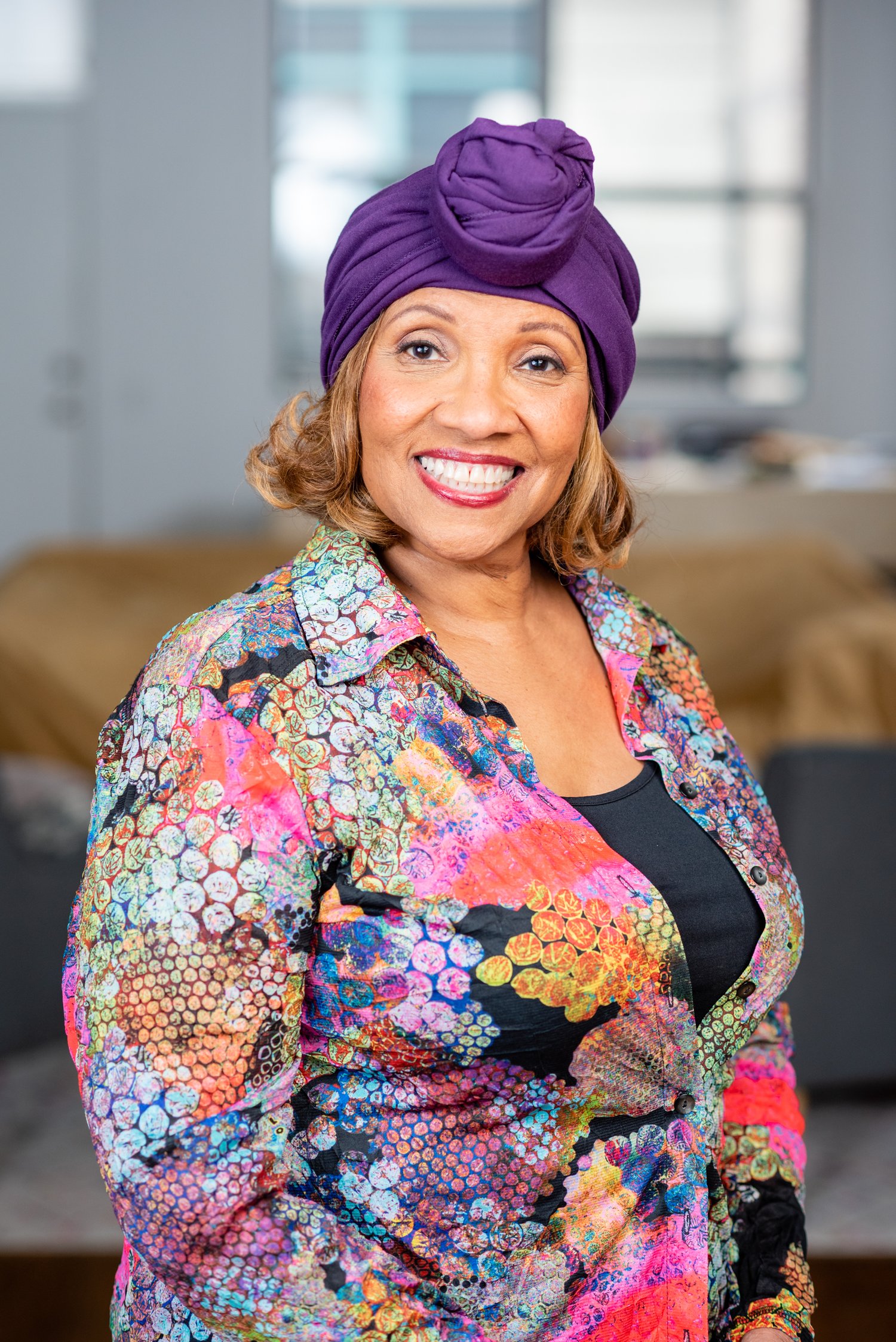
It was a great opportunity to speak with Lisa Lackey, M.A., LCPC, CSAT, CMAT, Chief Engagement Officer of Insideout Living, Inc., and CEO of Lisa Lackey Speaks. She is a licensed clinical therapist, coach, consultant, and keynote speaker. After the interview, she showed her appreciation for having been asked to do this interview, "Well, I thank you. And I thank BlackDoctor.org; they're the only one of its kind out here. So, I appreciate having this opportunity."
Q: So, who is Lisa Lackey?
A: I am a Black woman. Daughter of a Black Woman. Granddaughter of Black women. Offspring of Black ancestors. Those connections have informed my life path and calling. From childhood, I knew that there was something bigger than me that was loving, patient, and approachable. It is that being, which I call God, that was present during times of celebration, pain, confusion, and clarity. Professionally and personally, my work has centered around carrying a message of healing and holding space for those who felt hopeless. This is me giving back what has been given to me throughout my life. I am a bridge builder from perceived brokenness to wholeness.
The professional spaces that allowed me the greatest opportunity for growth and service have been as a pastor, and a Licensed Clinical Professional Counselor. Over the last several years, my professional and personal experiences have culminated in my current work as a keynote speaker, wellbeing coach, and consultant to organizations willing to prioritize Black women's wellbeing.
Q: What do you enjoy most about what you do?
A: What I enjoy most is feeling like a puzzler. People come in and give me their pieces, and together, we find the stories of where those pieces go, how they got misplaced, and how to integrate them into a life of wholeness within a framework informed by neurobiology, spirituality, and a strength-based model. Soon, clients learn that "the problem" that initiated their engagement with me is really not the problem. For many, that "problem" is the tip of the iceberg. My work is to support clients in exploring the causes and conditions that led to the "problem," which is often a maladaptive solution.
What I want to do is find out how to get to the origin of the root cause so that people can change patterns and go on to live their lives, healing intergenerational patterns.
RELATED: How We Find Healing After Race-Related Trauma
Q: So, I know that you mentioned trying to find the root of why it is now, to try and combat the continuation of that. So, within the black community and everything, therapy itself is, is pretty stigmatic, but what I'd like to focus on is trauma therapy. What is trauma therapy? What is the importance to the black community? How will our trauma engulf us if not addressed?
A: What is trauma therapy? The therapeutic relationship is one of the experiences in which healing happens. To engage in therapy, we must feel safe with the "3 P's": place, person, and process. This necessary sense of safety is an individual decision often thought of as a gut reaction in the beginning moments of connection.
We walk clients through steps to identify cycles of mobilization (anxiety, stress, agitation), disconnection (overwhelm, hopelessness, despair), and engagement (regulated, safe, well-being). Current-day triggers activate a "drive to survive" in response to the "longing to connect." As part of the process, the client completes a trigger and resources map, regulation map, and tracking graph, which traces the path of trigger and trauma through the client's brain and body to create a new pathway that resolves the trigger in an empowering manner.
This work allows the client to gain confidence in their internal resources to support them in staying grounded while engaging in stressful experiences. From this place, the client finds new options for addressing current issues that are frightening, challenging, and normally dysregulating with more confidence and courage.
People don't understand that other traumas impact us, and if we don't have a place to process those, they impact us throughout life. Those traumas appear unconsciously. Say, you were always left alone, had plenty to eat, and your home was nice—but you were always left alone. Or say you went to a school where you were bullied by teasing or being uninvited to things, and that was continuous; those things are traumas. Traumas are something that feels too big for you to resolve. You feel helpless, alone, and unable to access any sense of safety.
Then, as Black people in the United States, we are going to experience trauma. We're going to experience trauma through systematic racism, caste systems, and everything that comes through their emotional, social, psychological, and spiritual impact. And we become so used to these different aggressions that we automatically react to them by mobilizing the fight/flight response or immobilizing, the freeze/faint response. We normalize so much of what we regularly experience, and we think, "Oh no, I haven't experienced trauma." Whether we know it to be trauma or not, our bodies and brains store the trauma, and it becomes embedded in negative beliefs we have about ourselves that are not true. Trauma changes the lens which we see ourselves in the world compared to others. It informs how we behave.
Trauma from the past shows up in the present through triggers. An example may be if someone gives you a friendly pat on the back, and your first internal response is a feeling of electricity running through your arms and legs, your heartbeat is faster, and your impulse is to fight this person. In that moment, your mind and body are connected to a past of physical abuse; your nervous system sends a danger alert. And those automatic responses come from early defenses used to help us have some sense of unsafe experiences. So, I think that in our community, it's really important to educate and to help people understand how many different ways we can be impacted and how if you have traumatic experiences that are not processed, what ends up happening is that trauma gets stored in your brain and your body, releases massive amounts of cortisol, creating disastrous mental and physical outcomes. Without the opportunity to understand and practice internal and external safety, it is like having many screens open on your computer; it's not running as efficiently as it could. So that's one way of explaining trauma.
Q: How can addressing it propel us forward as individuals or as a community?
A: As I said before, I think education incorporates that knowledge organizationally. So, for example, having well-being programs that focus on mental health and spiritual health, emphasizing a strength-based model where we educate in a way that highlights our history of resilience and our creative healing abilities. We're talking about how to use this embedded strength to overcome embedded trauma, leading lives of well-being and being in the service, leading our communities into being well. And so, I think we often have to de-stigmatize getting help by providing culturally familiar environments where people feel seen, accepted, and welcomed.
Q: Since addressing it has such a positive impact, what do you think is the lingering stigma?
A: I think not enough people talk about it. I think transparency is important. Hearing people's stories of their mental health healing journeys that look like us. I think that it is normalizing it. Letting people know that getting therapy doesn't mean you're crazy or something's wrong with you. It means that we all need support, and most of us at one point receive that in relationships, tight-knit communities, and seeing examples that look like us. And we don't have community experiences as often anymore. People are very isolated and insulated. Sharing our before and after experiences—intentionally creating spaces for that. We can start with those closest to us, from the pulpit, through books, family gatherings, and more.
Q: For us to feel comfortable seeking help, like you mentioned, hearing other people like us talk about it and address it. How can we go about finding help? Like what, what kind of resources are out there other than yourself?
A: Well, I think that, and this might sound really strange, there's a number of excellent Black therapists that regularly post on social media. There are a lot of black clinicians on social media sharing great information about trauma but also providing different resources almost anywhere in the world. Search Joy Hardin; she provides resources throughout the United States. Being Black doesn't necessarily mean they're a right fit for you. Asking questions about the therapist's experience with trauma and working with black people is helpful. Ask your friends and family.
There are different places to find these resources. But I do encourage people that if they choose someone, they realize that they're interviewing that person who is going to be working for them. So, you can ask them anything you want to know: their experiences, how they work, who their ideal client is, and that kind of thing.
Q: What would you say makes a good trauma therapist? How does trauma therapy work?
A: So here's my thing. I believe that you can't take anyone further than what you've been willing to do yourself; otherwise, it feels inauthentic. A good therapist is someone who has worked on their own healing journey, whether that was through therapy or, coaching or indigenous practices, so you can ask that question as well. When you're seeing a therapist, I think that it's someone who is well-trained in a blend of various modalities, including therapy for the mind and body within various areas of specialized trauma treatment. And by that, I mean there are a lot of therapists out there that do talk therapy. In actuality, talk therapy is not as effective as therapy that incorporates the body, mind, and spirit. I can't help but mention Insideout Living; my husband and I co-founded this practice, and there are great therapists who work with trauma.
Some of those kinds of therapies are things like Eye Movement Desensitization Reprocessing (EMDR), which helps you to process trauma by starting at the earliest remembered experience of a particular trauma. And really, it allows you to do that in such a way that you can resolve the trauma a lot easier than you could if you were talking about it. Sometimes, talking about the trauma is retraumatizing. There's somatic therapy, yoga therapy, and art therapy. There are different ways to get to the trauma in a gentle way that deepens the healing. So, I would say that a good trauma therapist should have more than one trick in their bag.
Q: I know from doing my research that you focus on high-achieving black women. I think I was looking at your website, and I saw that success without stress is related to trauma therapy in a sense. Or does that just kind of shift off into something different?
A: So success without stress is work I do with highly successful black women primarily and other women in different venues. Where does the stress is coming from? I specialize in helping clients resolve traumatic stress from a belief that the mind-body connection is the key to recovery. Working with traumatic experiences requires moving away from the belief that trying to think our way out of the past or containing our memories and constraining our behaviors will bring resolution. It requires turning toward how our experience is held in the body and the brain and engaging with models of processing that recognize this principle.
And so when you talk about things like code-switching, when you talk about things like quote-unquote microaggressions that aren't micro, when you talk about how much more advanced a Black woman has to be in professional spaces to gain entry into the hierarchy of their professional life, all of that and more contributes to chronic stress, within systems that don't care about your wellbeing. And if it continues, it becomes burnout. I believe that there is also some underlying trauma that is experienced within this group of women; again, we don't always know what that is until we start to dig in and ask about the triggers to your stress; what are the beliefs that you have about yourself? What are your patterns of pleasing? And, you know, really looking at that. We also provide the ACE screening, it is The Adverse Childhood Experience assessment—a very short questionnaire about things that happened to you before your 18th birthday.
That helps to shed light on early traumas that were not resolved and currently add to current stress. And so, a lot of what I do is help people in those spaces first understand what boundaries are and help people understand who they are outside of their professional role—then retrieving and excavating that person's authentic identity that has often been buried under the noises of other person's interpretations and definitions that accompany systemic racism in work culture. My approach is from the inside out. So it's not just here are some stress management tips, but more so, here are the causes and conditions, and creating a personalized map that guides women to the greatest extent of well-being. And I try to do that work in a safe community, like cohorts or group coaching, workshops, and healing pods, because we also build off other women's strengths.
Q: So you just mentioned cohorts and groups. Is there anything you are offering right now for people to look forward to or something coming up that they can join if they have any additional questions or need help after reading this article?
A: Sure. So I would say go to Lisa Lackey, which will also, if you look through it, provide a link to my other website, Insideout Living (insideoutrecovery.com), and on lisalackey.com, you'll find all the different things that I offer to organizations, individuals, and groups related to decreasing the stress and all of the symptoms that come as a result of it. Coaching focuses on liberating the client's natural ability to move toward well-being and health from the "inside out." Committed to their ongoing healing and growth, we are passionate about facilitating change for individuals, couples, families, and groups.
Currently, we have a cohort that's coming up in a couple of weeks. I'm very excited about it. It is designated for black women professionals only, and it's a 10-week cohort where we break down the principles of well-being (7 Principles of Success — Lisa Lackey) and the things that cause us stress and how to detect how we're feeling sooner than later so that we can give intervention to that. And just an opportunity to look at yourself, reflecting and your worth outside of anything you do.
We look at that in four parts. We have people look back over what their patterns have been. We have people look at what they need to let go of in order to incorporate more well-being into their lives. And then, as women, we have difficulty receiving; we're usually great givers, but how do we start to be receptive to the support and help around us? And then the last part is return. And so the women will return with a map so that they can stay accountable to the strategies and systems they put in place during the cohort to manage a life with much more room for self-care.
Q: So, what advice would you give anyone looking for help? Maybe starting trauma therapy or trying to go into any type of therapy?
A: I would simply suggest that they start. Start the looking process and commit to follow through by a certain time. Have someone that you can be accountable to, to stay on track. Most of the time, when people are right at the edge of actually seeking therapy or coaching, they've been thinking about it for a long time.
We don't pick up that phone or go online for many reasons. And you have to start. I think the other thing is that once you start, it's not a committed relationship like a marriage or something. So, if the therapist doesn't work out for you, you look again and find someone who will work out. But I tell people to try, if they can, at least six times before they decide not to go back. That's the advice that I would give. Because what happens is that you can look and research and do all that stuff, and it can be years later, and you still haven't followed through on what you believe you need.
Q: And is there anything you feel like that maybe we didn't address that you would like to add?
A: I think that we don't realize, as a community, when I say we, I mean many of us as black people. But again, I'm focusing on the women, the state of emergency that we're in as black women; we are literally seven years older than a white woman that's our similar age because of the wear and tear and stress –it's called weathering. And I always say Black doesn't crack on the outside, but on the inside, we carry so much responsibility and burden in so many areas that it impacts us. I think the other thing is going back to that example of when you're on a flight, they say put your oxygen mask on first because it's counterintuitive, but if you don't, you won't be able to breathe to help someone else.
I think frequently, as black women, we have a lot of guilt around taking time for ourselves. We have a lot of guilt around asking for help. We have a lot of guilt around if this will put someone out. And so I think understanding that your mental and spiritual well-being is your lifeline and we're dying sooner than we need to, may be a motivator. And if we're living, we have many more chronic illnesses than we need to if we were able to manage some of the stress that's in our bodies and process some of the trauma of our experiences.








